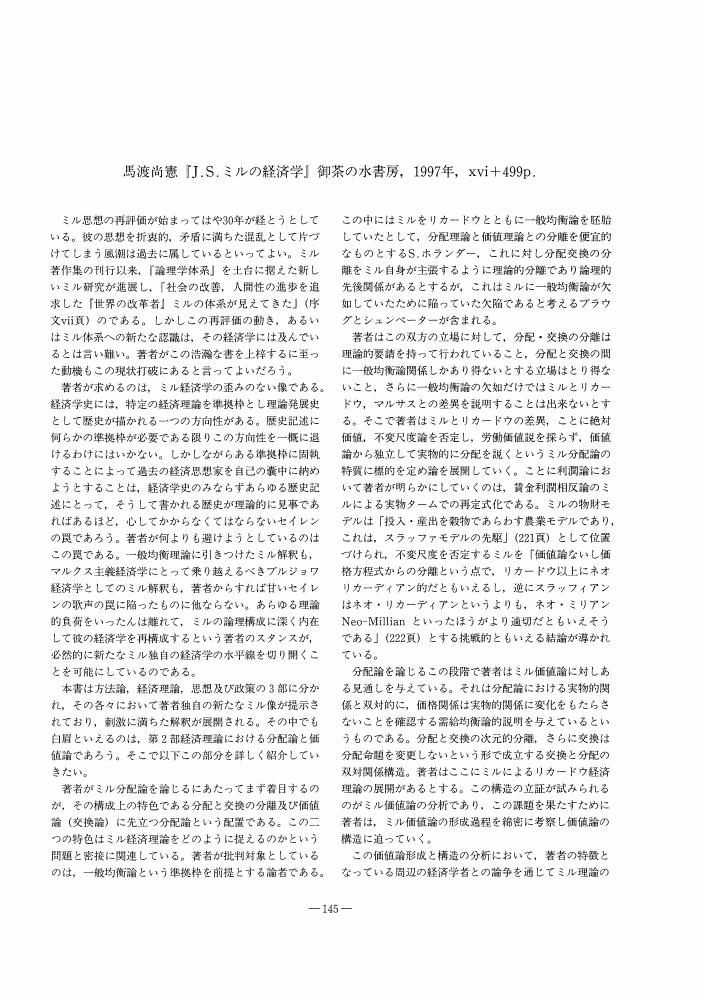1 0 0 0 OA 書評
1 0 0 0 OA 杉原四郎 J.S.ミルと現代
- 著者
- 杉原 四郎 松井 名津 橋本 昭一 Robert Chapeskie
- 出版者
- The Japanease Society for the History of Economic Thought
- 雑誌
- 経済学史研究 (ISSN:18803164)
- 巻号頁・発行日
- vol.60, no.1, pp.100-136, 2018 (Released:2019-09-03)
Introduction by Shoichi Hashimoto Shiro Sugiharaʼs “Nature, Human Beings, and Labour,” translated here into Eng-lish, was originally published in Japanese in J. S. Miru to Gendai (J. S. Mill and the Present Day), 1980, Tokyo: Iwanami Shoten, and reprinted in Volume 2, 2003, of The Works of Shiro Sugihara, 4 Volumes, 2003-, Tokyo: Fujiwara Sho-ten. Shiro Sugihara (1920-2009) began his study of the history of economic thought with a comparison of Karl Marx and J. S. Mill. While he does not ex-plicitly mention it in any of his writings, in this he may have been influenced by his mentor, Kei Shibata (1902-1986). Shibata had been attempting to further develop Marxʼs theory of reproduction using the methods of general equilibrium theory. While carefully tracing the process of development of Marxʼs economic thought, by explicating Marxʼs crit-icism of Mill Sugihara played a major role in the post-war Japanese movement to re-evaluate Mill, who had historically received only low appraisal. Sugihara presented Millʼs stance of engaging with contemporary economic issues in a positive light, an approach that is given full expression in the essay translated here. While Japanese readers would not require any explanation regarding Sawako Ariyoshi (1931-1984), the novelist who appears at the start of the es-say, she was a writer who raised new social issues such as synthetic pollution, food damage, issues related to the elderly, and so on, that have since become common knowledge, posing them to society in a series of works written in rapid succession that all went on to become bestsellers. As a result of the nature of her writing she was ignored by various literary awards.
- 著者
- 松井 名津
- 出版者
- 経済学史学会
- 雑誌
- 経済学史研究 (ISSN:18803164)
- 巻号頁・発行日
- vol.54, no.1, pp.114-115, 2012 (Released:2019-10-31)
1 0 0 0 OA 馬渡尚憲『J. S. ミルの経済学』御茶の水書房, 1997年, xvi+499p.
- 著者
- 松井 名津
- 出版者
- 経済学史学会
- 雑誌
- 経済学史学会年報 (ISSN:04534786)
- 巻号頁・発行日
- vol.36, no.36, pp.145-146, 1998 (Released:2010-08-05)
1 0 0 0 OA J. S. ミルの社会科学論
- 著者
- 松井 名津
- 出版者
- The Japanese Society for the History of Economic Thought
- 雑誌
- 経済学史学会年報 (ISSN:04534786)
- 巻号頁・発行日
- vol.34, no.34, pp.53-64, 1996 (Released:2010-08-05)
- 参考文献数
- 35
This paper examines the purpose and intentions underlying Mill's methodological treatises. From “a priori” method to “concrete deductive method” Mill struggled for the method of social science that would be more sensitive to complexity and diversity, on which a new social science would build. Mill agreed with Comte for the need of a new science but rejected his sociology, because Mill intended to construct a new social science to guide public opinion, not to dominate it. On the other hand, Mill saw contemporary economists as narrow-minded neglecting the truth or vision that would guide human action. To write “Principles of Political Economy”, for Mill was more than to show the truth of economic phenomena by the concrete deductive method. It was to show the public the prospect of transition and its possibie, desirable way.Along this line, Mill criticized “mercantilism” as seeing only material goods, especially money, as wealth, then extending the notion to the means that fulfill one's purpose effectively. In doing this Mill went close to the ethical-economic approach by A. K. Sen.


